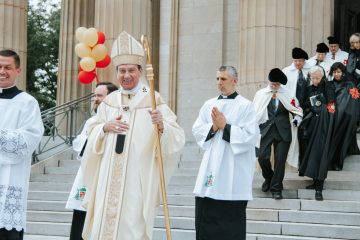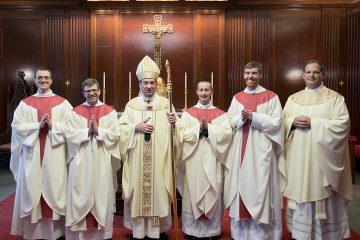Sunday Scripture: Students in the Lord’s classroom
Wednesday, July 22, 2009
By Father Timothy Schehr
Seventeenth Sunday in Ordinary Time: 2 Kings 4:42-44; Psalm 145:10-18; Ephesians 4:1-6; John 6:1-15
How good a student would any one of us be in the Lord’s classroom? It might be comforting to know that even the twelve apostles struggled…at least in the beginning. In the Gospel for this Sunday, for example, Jesus gives Philip a quiz question. And it doesn’t seem Philip would get the highest grade for his answer. But let’s back up a little to get the bigger picture.
As the Gospel begins, Jesus is on a mountain, sitting with His apostles and others. He is most likely teaching them. John tells us the Jewish Passover was coming up. So the subject that day was probably Israel’s journey from Egypt to the Promised Land. God nourished the people with manna throughout that journey. And, of course, the manna theme would be a perfect preparation for the miraculous feeding of thousands that Jesus is about to do. One important lesson about the manna is that the Israelites must learn to rely on God rather than on their own earthly resources.
So when Jesus asks Philip, “Where can we buy enough food for them to eat?” a really good answer would have been something like, “We don’t have the resources but our heavenly Father does!” But Philip is still thinking in terms of the limited resources of earth. He says 200 days wages would purchase enough food for each one in the crowd to have just a few bites. We do have to admire how much thought Philip put into this. He has really crunched the numbers to come up with such a precise answer!
Then Andrew speaks up. He has found someone in the crowd who actually has food already. But five barley loaves and a couple of fish will never do with a crowd of thousands. Or will it? Jesus directs the apostles to have the people prepare to eat. Through the power of God all are satisfied. There are 12 baskets of fragments remaining! Each of the 12 apostles holds in his hands unmistakable evidence of God’s power to nourish.
The people now want to declare Jesus their king. But this would give entirely the wrong message so Jesus withdraws to the mountain alone. And where are the apostles who were with Him on that mountain when the reading began? Perhaps they are thinking along the same lines as the crowd.
The first reading also records a miracle by which many are nourished with just a few loaves. We go back to the days of Elisha some 800 years before the time of Jesus. The great prophet declares that a few loaves of barley will be more than enough to feed 100 people. Elisha’s servant seems to suffer from the same limited thinking that plagued the apostles in the gospel. But he too learned a lesson about the power of God.
In the second reading Paul provides a good study-guide for learning to rely on God. He urges the faithful in Ephesus to live their lives in a way worthy of the call they received when they committed themselves to the Lord. The apostle offers some practical guidelines: “humility and gentleness, with patience, bearing with one another through love, striving to preserve the unity of the spirit through the bond of peace…”
Paul’s message is this: if we strive to remain one with each other as God remains one with us then we will be well on the way to truly putting faith into practice. Paul could testify to the challenges this involves. Even as he writes this letter to the Ephesians he is “a prisoner for the Lord.” But if we take Paul’s example and serve the Lord as best we can, it is likely we will receive high marks from the court of heaven.
Father Schehr is a faculty member at the Athenaeum of Ohio.









